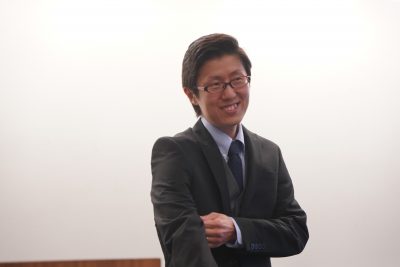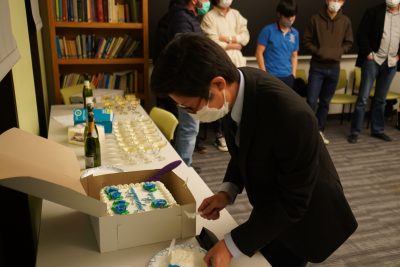The 2nd annual workshop on Agency and Intentions in Language took place virtually on January 12-14, 2022, organized by Harvey Mudd College. Magdalena Kaufmann gave an invited talk at the workshop, titled: “Tracking Presumed Control”
Other News
UConn Linguists at the LSA Annual Meeting
The 96th Annual Meeting of the Linguistic Society of America is taking place January 6th-9th in Washington, DC and virtually. UConn linguistics will be well represented at the conference with talks by:
- Si Kai Lee. Movement is Exhausting: Optional wh-fronting in Singlish is not free (in-person)
- Muyi Yang. The closeness constraint on focus association and the syntax of Q-particles (hybrid)
… and poster presentations by:
- Yusuke Yagi. Strawson Semantic Value: An explanation for the definite reading in ellipsis (in-person)
- Pasha Koval and Jon Sprouse. Relative Clause Extraposition in Russian is created by syntactic movement (in-person)
- Ari Goertzel. The Properties of the -o clitic in Mandinka (online)
- Shengyun Gu. Combined methods are informative: weak hand spread in Shanghai Sign Language (online)
- Ivana Jovović. On Discourse Licensing of Coindexed Pronouns in Slavic (online)
- Hiroaki Saito. Losing a subject, keeping an indirect object
- Nick Huang (postdoc 2019-2021, now at the National University of Singapore) and Yu’an Yang. How do learners know attitude verbs select what in wh-in situ languages? (online)
- Zheng Shen (PhD 2018, now at National University of Singapore) and Meghan Lim. Extraction from definite, indefinite, and superlative NPs: An experimental approach
Magda & Stefan Kaufmann | Article in Journal of Semantics
Magda and Stefan Kaufmann’s paper “Iffy Endorsements” has been published online as an advance article in the Journal of Semantics.
Abstract: Theories of imperatives differ in how they aim to derive the distributional and functional properties of this clause type. One point of divergence is how to capture the fact that imperative utterances convey the speaker’s endorsement for the course of events described. Condoravdi & Lauer (2017) observe that conditionals with imperative consequents (conditionalized imperatives, CIs) are infelicitous as motivations of advice against doing something and take this as evidence for an analysis of imperatives as encoding speaker endorsement. We investigate CIs in further contexts and argue that their account in terms of preferential conflicts fails to capture the more general infelicity of CIs as motivations for or against doing something. We develop an alternative in which imperatives do not directly encode speaker preferences, but express modalized propositions and impose restrictions on the discourse structure (along the lines of Kaufmann, 2012). We show how this carries over to conditionalized imperatives to derive the behavior of CIs, and conclude with a discussion of more general problems regarding an implementation of conditional preferential commitments, an issue that can be avoided on our account of imperatives.
Magdalena & Stefan Kaufmann & Mitch Green | CLAS Grant
Magda Kaufmann, Stefan Kaufmann, and Mitch Green (UConn Philosphy) have been awarded a grant to support their joint project “Conditional Thought and Talk” within the Research Funding in Academic Themes initiative by the College of Liberal Arts and Sciences. The grant covers a range of research activities and events in the 2022-23 academic year.
Oda Defense
Hiromune Oda successfully defended his dissertation titled “A more fine-grained distinction of NP/DP-languages and parameters in minimalism” on December 9th.
Congratulations, Hiro!
Hiro before his defense:

Dr. Oda with his well earned cake:

(photos: Yoshiki Fujiwara)
Hiromune Oda | Article in TLR
Hiromune Oda‘s paper Decomposing and deducing the Coordinate Structure Constraint has been published online in The Linguistic Review ahead of the print version (see short abstract below). Congratulations Hiro!
The article shows that the Coordinate Structure Constraint (CSC) can be violated in a number of languages and establishes a novel cross-linguistic generalization regarding languages that allow violations of the CSC. A phase-based deduction of this generalization is then provided under a particular contextual approach to phases. In addition, based on the cross-linguistic data regarding violations of the CSC, it is argued that the CSC should be separated into two conditions: (i) the ban on extraction of a conjunct, and (ii) the ban on extraction out of a conjunct. This means that the whole coordinate structure (ConjP) as well as individual conjuncts are islands independently of each other. The article also addresses the long-standing debate regarding where in the grammar the CSC applies, arguing that the two different conditions that result from the separation of the traditional CSC ((i) and (ii) above) are deduced from different mechanisms in the architecture of the grammar: one is a purely syntactic condition, and the other is an interface condition.
M. Kaufmann & Krishnan receive SHARE grant
Magdalena Kaufmann and Kavya Krishnan (cognitive science major) have obtained a Social Sciences, Humanities, and Arts Research Experience (SHARE) grant for their project “How to reason in Nepali” to investigate Nepali conditionals in Spring 2022.
Interview with Linguistics and Philosophy major in UConn Magazine
An interview with Adrienne Bruce, a Linguistics and Philosophy major, has appeared in UConn Magazine. Adrienne is spending this semester at Sogang University in Seoul, South Korea, on a Gilman Scholarship for undergraduate studies abroad from the U.S. State Department. The full interview can be read here: “Speaking the Language”.
William Snyder | Tsing Hua University Colloquium
William Snyder will be giving a colloquium talk at Tsing Hua University on 29th October 2021. The talk will be titled “Evidence from child language acquisition for a parametric model of syntax”
Abstract:
In this talk I will present three case-studies, each based on longitudinal records of children’s spontaneous speech, that illustrate what happens when a child’s syntax undergoes a change. The first case-study, examining the acquisition of English verb-particle constructions, shows a near-total absence of commission errors. The second, examining prepositional questions in the speech of children acquiring English or Spanish, shows (first) that children may go as long as 9 months producing both direct-object questions and declaratives with prepositional phrases, before they even attempt to ask a prepositional question; and (second) that at some point, abruptly, children begin producing prepositional questions that are correctly formed for the target language. The third case study shows that in children acquiring English, the onset of verb-particle combinations occurs almost exactly when that child begins producing novel noun-noun compounds. I will argue that these findings, taken together, strongly favor a parametric approach to cross-linguistic variation in syntax. I will argue further that the findings have implications for the format of parameters, and for the process by which children set them.
Information on how to attend the talk virtually can be found here.
Stefan Kaufmann | Algorithmic Arts & Humanities Colloquium
Stefan Kaufmann will be speaking at the Algorithmic Arts & Humanities colloquium at the UConn Humanities Institute on October 21, 2021 at 12:30pm in HBL 4-209. The event will be livestreamed and you can attend in person. Here is the link for more information: https://humanities.uconn.edu/2021/10/11/dhms-presents-algorithmic-arts-humanities-at-uconn/